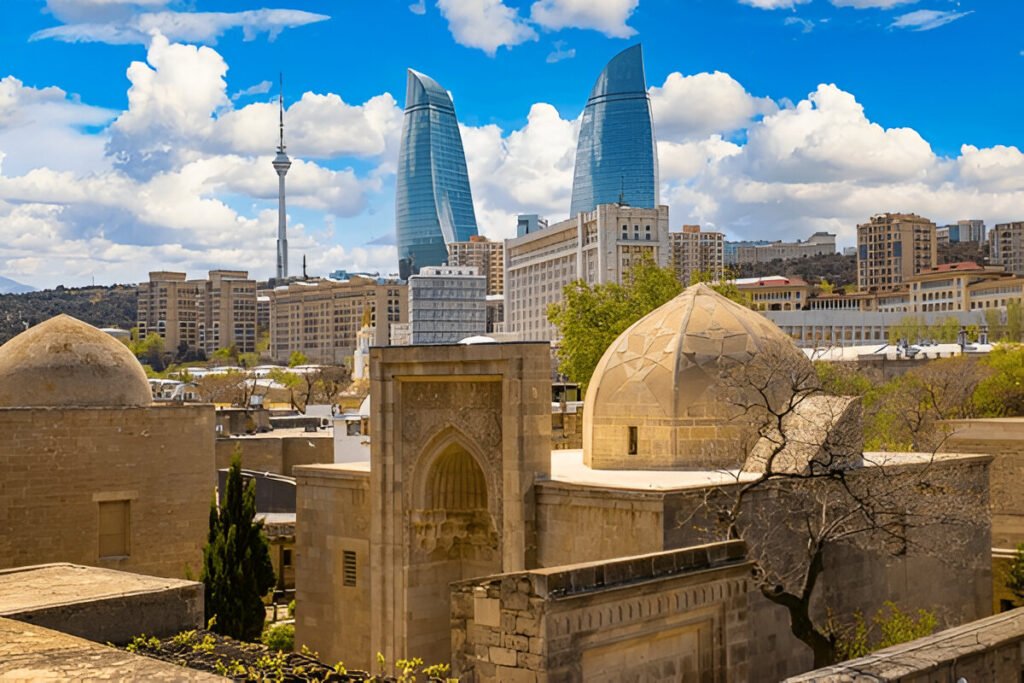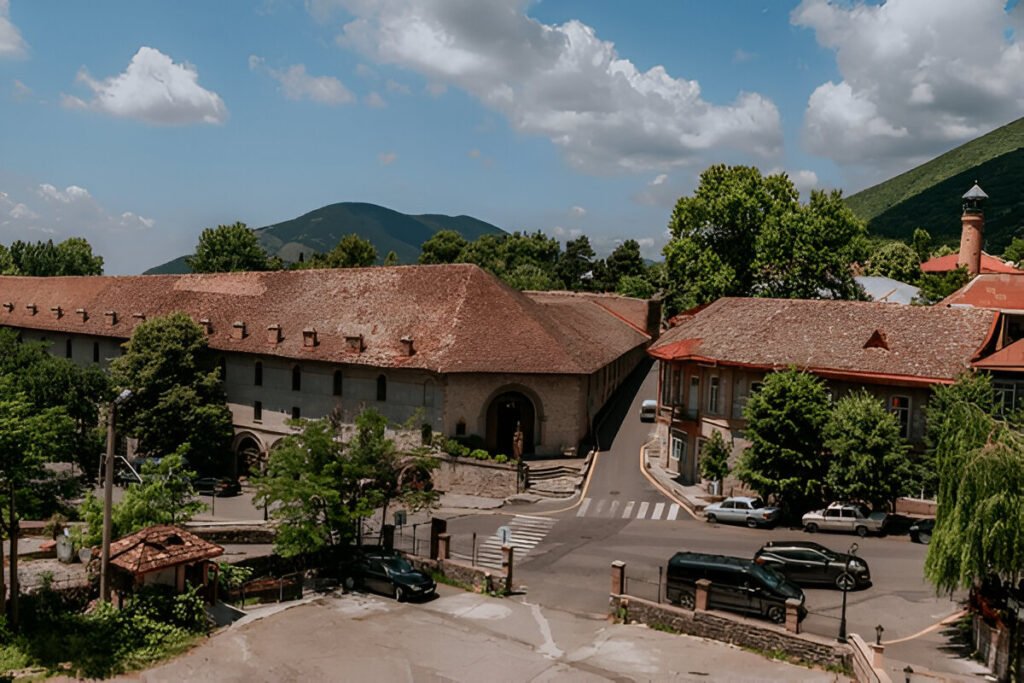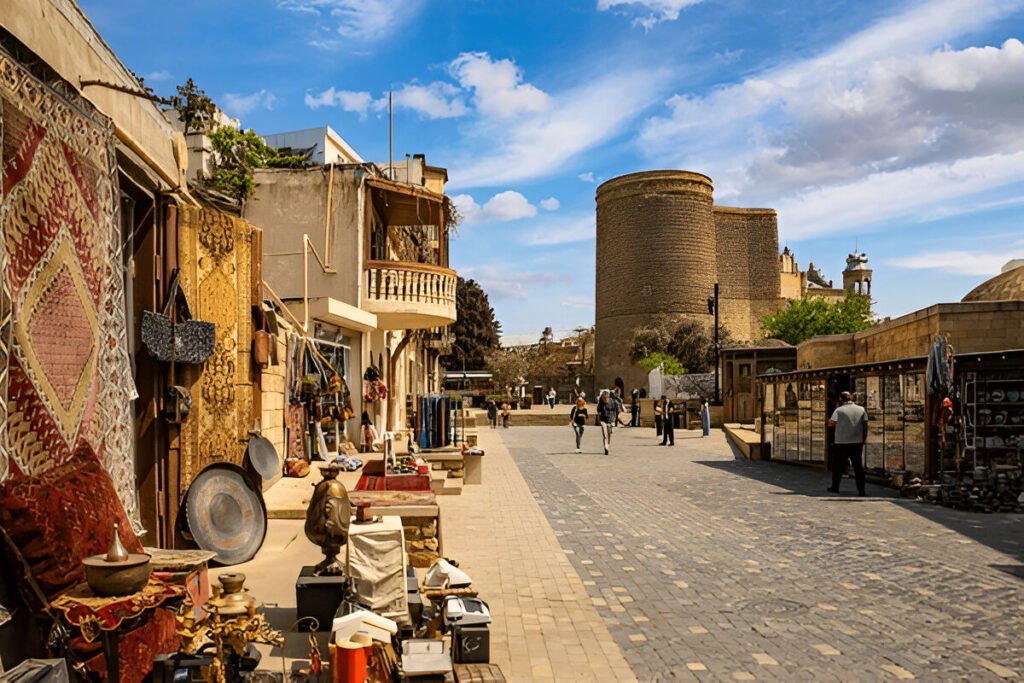Introduction
Nestled in the foothills of the Greater Caucasus Mountains, Sheki is one of Azerbaijan’s most charming and historically rich cities. Known for its natural beauty, architectural wonders, and historical significance, Sheki offers a unique opportunity to explore the ancient Silk Road, which once connected the East to the West. With its captivating mix of ancient and modern influences, Sheki has managed to preserve its cultural heritage while embracing the future, making it a must-visit destination for anyone seeking to uncover the essence of Azerbaijan.
Sheki is located in the northwest of Azerbaijan, about 330 kilometers from Baku. The city has been an important center of trade, culture, and religion for centuries, owing much of its prosperity to its strategic location along the Silk Road. It served as a gateway between Central Asia, Persia, and the Caucasus, and was renowned for its silk production, which is still an important part of its identity today.
A Brief History of Sheki
Sheki’s history stretches back over 2,000 years. It was initially known as “Shaki” in ancient times, and archaeological evidence suggests that it was inhabited as early as the 5th century BC. Throughout its history, Sheki has been ruled by various empires and dynasties, including the Sassanids, Arabs, Seljuks, and Safavids. The city’s strategic position made it an important stop for traders and travelers along the Silk Road, a role that helped shape its cultural and economic development.
During the 18th and 19th centuries, Sheki flourished as a major center for silk production. The region’s fertile climate, combined with its proximity to trade routes, allowed the local economy to thrive, and Sheki’s silk was highly prized in markets across the world. The city also became known for its fine handicrafts, such as carpets and copperware, many of which are still produced today using traditional methods.
Exploring Sheki’s Architectural Wonders

One of Sheki’s most remarkable features is its stunning architecture, which reflects the diverse cultural influences that have shaped the city over the centuries. From grand palaces to ancient mosques and caravanserais, Sheki offers an architectural journey that takes visitors back through time.
The Sheki Khan’s Palace
Perhaps the most iconic landmark in Sheki is the Sheki Khan’s Palace, a stunning example of Azerbaijani architecture. Built in the 18th century by the Sheki Khan, it is renowned for its intricate design, colorful stained glass windows, and beautiful frescoes. The palace is a fusion of Persian, Ottoman, and Azerbaijani architectural styles, showcasing the cultural melting pot that Sheki was during its heyday.
The Sheki Khan’s Palace is famous for its “Shabaka” windows, which are crafted from stained glass and arranged in intricate geometric patterns. These windows are a prime example of the region’s craftsmanship and artistic traditions. The interior of the palace is equally stunning, with delicate murals depicting scenes from Persian poetry, as well as motifs from Islamic and Azerbaijani art. The palace’s surrounding gardens provide a tranquil atmosphere, offering a glimpse into the opulent lifestyle of the Sheki Khans.
The Juma Mosque
Another historical gem in Sheki is the Juma Mosque, which dates back to the 18th century. This mosque is one of the oldest in the region and is a beautiful example of Azerbaijani Islamic architecture. The mosque’s simple, yet elegant design features a large prayer hall, an intricately designed mihrab (prayer niche), and a serene courtyard that offers a peaceful escape from the hustle and bustle of the city. The mosque remains an active place of worship, and visitors can observe the beauty and serenity of its interior.
Caravanserais and Historic Bridges
As a key stop on the Silk Road, Sheki was once home to several caravanserais—large inns where merchants and travelers could rest, eat, and protect their goods. Today, a number of these caravanserais still stand, providing a glimpse into the region’s past as a thriving commercial center. The Sheki Caravanserai, located near the town center, is one such example. It has been partially restored and offers a glimpse into the architectural style of these historic buildings, with its wide courtyards, thick stone walls, and simple yet functional design.
Additionally, Sheki is home to several historical bridges, including the Alazan Bridge, which spans the Alazan River. This 17th-century bridge is a testament to the engineering skills of the time and remains an important landmark in the city. The peaceful river setting and surrounding landscapes make it a lovely spot for reflection and exploration.
The Silk Road Legacy
Sheki’s historical significance as a Silk Road city cannot be overstated. The Silk Road, a network of trade routes that connected Asia to Europe, was a vital corridor for the exchange of goods, ideas, and cultures. Sheki’s location on this ancient route meant that it was not only a commercial hub but also a place of cultural exchange, where different civilizations interacted, traded, and influenced one another.
The city’s role in the Silk Road trade is still evident today in the local economy, which is heavily centered around the production of silk and other traditional crafts. Visitors can explore Sheki’s silk factories, where the same techniques used by artisans centuries ago are still employed to produce luxurious fabrics and textiles. The city also hosts a number of craft markets, where visitors can buy handwoven carpets, pottery, and copperware—reminders of the city’s rich artisanal heritage.
Natural Beauty and Scenic Landscapes

In addition to its architectural and historical treasures, Sheki is blessed with stunning natural beauty. Surrounded by lush forests, rolling hills, and the majestic Greater Caucasus Mountains, the city is an ideal destination for nature lovers and outdoor enthusiasts. The region’s climate is temperate, with warm summers and mild winters, making it a great year-round destination.
One of Sheki’s most beautiful natural landmarks is the scenic area of the Sheki Highlands, which offers breathtaking views of the surrounding mountains and valleys. Visitors can hike or drive through the picturesque landscapes, taking in the fresh air and enjoying the tranquility of this pristine natural environment.
Sheki is also known for its many waterfalls, including the majestic Gelersen-Görersen waterfall, located just outside the city. The name “Gelersen-Görersen” translates to “You will come, and you will see,” a reference to the breathtaking view that awaits visitors who make the effort to explore the area. The waterfall, surrounded by lush greenery, is a popular spot for both locals and tourists looking to connect with nature and enjoy the peaceful surroundings.
A Culinary Journey in Sheki

Azerbaijani cuisine is renowned for its rich flavors and diverse influences, and Sheki is no exception. The city is famous for its traditional dishes, many of which reflect the region’s history and agricultural abundance. One of the most popular dishes in Sheki is “Sheki Halva,” a sweet dessert made from nuts, sugar, and flour. It is often served with a cup of Azerbaijani tea, which is a central part of the country’s social and cultural life.
In addition to Sheki Halva, visitors can sample a variety of other Azerbaijani dishes, including kebabs, pilaf, and freshly baked bread. The region’s proximity to fertile agricultural lands means that fresh fruits, vegetables, and herbs are integral to the local cuisine. The abundance of honey, nuts, and dairy products in Sheki also makes the local food both delicious and nutritious.
Conclusion
Sheki is a hidden gem in Azerbaijan, offering visitors a fascinating blend of history, culture, and natural beauty. Its rich heritage as a Silk Road city, combined with its architectural treasures, scenic landscapes, and delicious cuisine, makes it a must-visit destination for those exploring Azerbaijan. Whether you are wandering through the opulent Sheki Khan’s Palace, admiring the intricate patterns of a handwoven carpet, or simply enjoying the peaceful beauty of the surrounding mountains, Sheki offers an unforgettable experience that captures the heart and soul of Azerbaijan.












